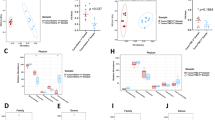Abstract
This case-control study explored compositions of gut microbiome in recurrent malignant gliomas patients who had received bevacizumab and Temozolomide combination treatment and Temozolomide monotherapy. We investigated gut microbiota communities in feces of 29 recurrent malignant gliomas patients received combination treatment with bevacizumab and Temozolomide (Group 1) and monotherapy with Temozolomide alone (Group 2). We took advantage of the high-throughput Illumina Miseq sequencing technology by targeting the third and fourth hypervariable (V3–V4) regions of the 16S ribosomal RNA (rRNA) gene. We found that the structures and richness of the fecal microbiota in Group 1 were different from Group 2 with LEfSe analysis. The fecal microbiota in both Group 1 and Group 2 were mainly composed by Firmicutes, Proteobacteria, Bacteroidetes and Actinobacteria. However, Group 1 patients had higher relative abundance of Firmicutes, Bacteroidetes, Actinobacteria and lower relative abundance of Bacteroidetes and Cyanobacteria in their fecal microbiota than that in Group 2 patients. To evaluate bevacizumab involved post-treatment state of the fecal microbiota profile, we used random forest predictive model and ensembled decision trees with an AUC of 0.54. This study confirmed that the gut microbiota was different in recurrent malignant gliomas patients received the combination therapy of bevacizumab and Temozolomide compared with Temozolomide monotherapy. Our discover can help better understand the influence of bevacizumab related treatment on recurrent malignant gliomas patients. Therefore, this finding may also support the potentially therapeutic options for recurrent malignant gliomas patients such as fecal microbiota transplant.





Similar content being viewed by others
Data availability
The datasets used and analyzed during the current study are available from the corresponding author on reasonable request.
References
Tan AC, Ashley DM, Lopez GY, Malinzak M, Friedman HS, Khasraw M (2020) Management of glioblastoma: state of the art and future directions. CA Cancer J Clin 70:299–312. https://doi.org/10.3322/caac.21613
Wick W, Osswald M, Wick A, Winkler F (2018) Treatment of glioblastoma in adults. Ther Adv Neurol Disord 11:1756286418790452. https://doi.org/10.1177/1756286418790452
Nishikawa R (2010) Standard therapy for glioblastoma–a review of where we are. Neurol Med Chir (Tokyo) 50:713–719. https://doi.org/10.2176/nmc.50.713
Geribaldi-Doldan N, Hervas-Corpion I, Gomez-Oliva R et al (2021) Targeting protein kinase C in glioblastoma treatment. Biomedicines. https://doi.org/10.3390/biomedicines9040381
Agirman G, Hsiao EY (2021) SnapShot: the microbiota-gut-brain axis. Cell 184:e2521. https://doi.org/10.1016/j.cell.2021.03.022
Kincaid HJ, Nagpal R, Yadav H (2021) Diet-microbiota-brain axis in Alzheimer’s disease. Ann Nutr Metab. https://doi.org/10.1159/000515700
Polak K, Bergler-Czop B, Szczepanek M, Wojciechowska K, Fratczak A, Kiss N (2021) Psoriasis and gut microbiome-current state of art. Int J Mol Sci. https://doi.org/10.3390/ijms22094529
Gong S, Feng Y, Zeng Y et al (2021) Gut microbiota accelerates cisplatin-induced acute liver injury associated with robust inflammation and oxidative stress in mice. J Transl Med 19:147. https://doi.org/10.1186/s12967-021-02814-5
Kalia VC, Patel SKS, Cho BK, Wood TK, Lee JK (2021) Emerging applications of bacteria as antitumor agents. Semin Cancer Biol. https://doi.org/10.1016/j.semcancer.2021.05.012
Zhou CB, Zhou YL, Fang JY (2021) Gut microbiota in cancer immune response and immunotherapy. Trends Cancer. https://doi.org/10.1016/j.trecan.2021.01.010
Woelk CH, Snyder A (2021) Modulating gut microbiota to treat cancer. Science 371:573–574. https://doi.org/10.1126/science.abg2904
Strati F, Pujolassos M, Burrello C et al (2021) Antibiotic-associated dysbiosis affects the ability of the gut microbiota to control intestinal inflammation upon fecal microbiota transplantation in experimental colitis models. Microbiome 9:39. https://doi.org/10.1186/s40168-020-00991-x
Gola A, Dorrington MG, Speranza E et al (2021) Commensal-driven immune zonation of the liver promotes host defence. Nature 589:131–136. https://doi.org/10.1038/s41586-020-2977-2
Breuninger TA, Wawro N, Breuninger J et al (2021) Associations between habitual diet, metabolic disease, and the gut microbiota using latent Dirichlet allocation. Microbiome 9:61. https://doi.org/10.1186/s40168-020-00969-9
Vander Wyst KB, Ortega-Santos CP, Toffoli SN, Lahti CE, Whisner CM (2021) Diet, adiposity, and the gut microbiota from infancy to adolescence: a systematic review. Obes Rev 22:e13175. https://doi.org/10.1111/obr.13175
Rishi P, Thakur K, Vij S et al (2020) Diet, gut microbiota and COVID-19. Indian J Microbiol. https://doi.org/10.1007/s12088-020-00908-0
Patel SKS, Lee JK, Kalia VC (2020) Deploying biomolecules as Anti-COVID-19 agents. Indian J Microbiol 60:263–268. https://doi.org/10.1007/s12088-020-00893-4
Abellan-Schneyder I, Matchado MS, Reitmeier S et al (2021) Primer, pipelines, parameters: issues in 16S rRNA gene sequencing. msphere. https://doi.org/10.1128/mSphere.01202-20
Jain T, Boland T, Lilov A et al (2017) Prediction of delayed retention of antibodies in hydrophobic interaction chromatography from sequence using machine learning. Bioinformatics 33:3758–3766. https://doi.org/10.1093/bioinformatics/btx519
Riquelme E, Zhang Y, Zhang L et al (2019) Tumor microbiome diversity and composition influence pancreatic cancer outcomes. Cell 178:e712. https://doi.org/10.1016/j.cell.2019.07.008
Olah C, Varadi M, Horvath O, Nyirady P, Szarvas T (2021) Oncological relevance of gut and urine microbiomes. Orv Hetil 162:579–586. https://doi.org/10.1556/650.2021.32052
Acknowledgements
All colleagues collaborated in the collection and interpretation of the data and contributed to the manuscript.
Funding
Not applicable.
Author information
Authors and Affiliations
Contributions
JZ collected the samples, wrote the manuscript, prepared the figures. JS edited the manuscript.
Corresponding author
Ethics declarations
Competing interests
The authors declare no conflict of interest.
Consent to Participate
Written informed consent for the study was obtained from each patient involved in the study after oral notification.
Consent for Publication
Written consent for publication was obtained from all the patients involved in our study. No identifiable individual patient or health person was involved in this study.
Additional information
Publisher's Note
Springer Nature remains neutral with regard to jurisdictional claims in published maps and institutional affiliations.
Supplementary Information
Below is the link to the electronic supplementary material.
Rights and permissions
About this article
Cite this article
Zhu, J., Su, J. Alterations of the Gut Microbiome in Recurrent Malignant Gliomas Patients Received Bevacizumab and Temozolomide Combination Treatment and Temozolomide Monotherapy. Indian J Microbiol 62, 23–31 (2022). https://doi.org/10.1007/s12088-021-00962-2
Received:
Accepted:
Published:
Issue Date:
DOI: https://doi.org/10.1007/s12088-021-00962-2




